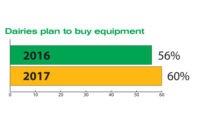While the recession has Wisconsin dairy processors scaling back on spending, they still plan to invest $781 million in their plants in the next five years.
Wisconsin dairy plants spent $1.24 billion on upgrades to equipment and facilities in the past five years, according to a recent survey by the National Agricultural Statistics Service (NASS).
NASS conducted the survey at the state agriculture department's request.
Agriculture is a $51 billion per year industry in Wisconsin, and much of that comes from dairy. Gov. Jim Doyle praised companies' investment plans in a statement.
"Wisconsin dairy plants are aggressively positioning themselves to invest in technological upgrades and new products," he said. "This dedication to investing in our cornerstone industry sends a strong signal to farmers, rural communities and our entire state."
NASS sent surveys to 185 plants in Wisconsin in January and February, and 68% responded. Companies with more than one plant were asked to respond only once.
According to results, four out of five dairy processors said they plan to expand in the next five years. One in five said they expect the amount of milk they process to increase by more than 26%. Only 3% expected to handle less milk.
However, industry spokesmen said the survey was done at a bad time for dairy processors. Cheese prices were lower than milk prices, making it a "pessimistic time" to ask about investment plans, said John Umhoefer, executive director of the Wisconsin Cheese Makers Association.
Given that, Wisconsin Milk Marketing Board spokesman Patrick Geoghegan said he thought the responses showed "a pretty optimistic outlook."
Farmers, who also have been pinched recently by low prices and high costs, should feel encouraged by processors' commitment to Wisconsin's dairy industry, he said.
"I think it indicates our cheesemakers want and need additional milk," Geoghegan said.
Upgrades to cheese plants accounted for most of dairy processors' investments in the past five years, NASS reported. Companies making less than 5 million pounds of dairy products per year spent the most money, a combined $414 million. Larger companies spent $388 million combined.
The investment by smaller companies reflects growth among Wisconsin's specialty cheesemakers, Geoghegan said. Craft cheese now makes up about 17% of Wisconsin's total cheese production, and that portion is growing, he said.
With the recession, companies plan to spend less, and most investment will likely come from bigger companies in the next five years, NASS reported.
Total investment in cheese plants is expected to be $392 million in the next five years, with nearly $345 million coming from companies that produce more than 5 million pounds of dairy products per year.
Umhoefer said spending reductions by smaller plants may reflect a greater ability to respond quickly to economic conditions.
"A small factory may react more quickly to a down market and postpone plans, where a larger corporate environment may have a five- to 10-year plan that they would continue to execute," he said.
If the economy turns around, smaller companies may invest more than predicted because some have plans that are ready to go and merely postponed, not abandoned, he said.
Companies also reported planning to invest $93 million in making whey products and $296 million in other dairy operations.
Most of the money invested will go to buildings and processing equipment, but companies are expected to spend more on waste treatment and utility upgrades, NASS reported.
Get our new eMagazine delivered to your inbox every month.
Stay in the know on the latest dairy industry trends.
SUBSCRIBE TODAYCopyright ©2024. All Rights Reserved BNP Media.
Design, CMS, Hosting & Web Development :: ePublishing


